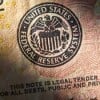Sorry, no content matched your criteria.
Featured Story
What This Week's Federal Reserve Interest Rate News Means for Markets in 2016

After another dovish Federal Reserve interest rate statement from Chair Janet Yellen yesterday, global stocks and commodities are rallying.
Investors can now expect lower interest rates to last deeper into 2016.
After another dovish Federal Reserve interest rate statement from Chair Janet Yellen yesterday, global stocks and commodities are rallying.
Investors can now expect lower interest rates to last deeper into 2016.
